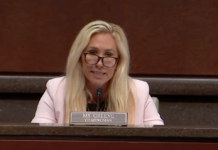
Full recovery for Georgia’s economy may remain out of reach until the public is inoculated against a disease that has killed more than 11,000 of its people since last spring, according to the state’s economist.
State Economist Jeffrey Dorfman, who is a University of Georgia professor, pointed to several encouraging signs that Georgia’s economy is heading in the right direction since the coronavirus first upended daily life and caused massive unemployment last spring.
“The fact that credit card debt is down, our credit scores are up and our savings in the bank is up all mean that when we’ve all been vaccinated, we have the pandemic under control and can get back to whatever will become normal after this, that our economic recovery should be quite strong and swift because people have the money to spend and are just waiting for the chance when it is safe to do so,” Dorfman said.
But it will still be a while before the vaccine becomes more widely available.
Georgia is now ranked near last place for the number of COVID-19 vaccines administered, although state officials say numbers coming from the Centers for Disease Control and Prevention shortchange the state. About 484,775 shots have been administered in Georgia, according to the state Department of Public Health’s website.
Dr. Kathleen Toomey, who is the state’s public health commissioner, told lawmakers Tuesday that it could take “many, many, many months” to vaccinate the public. Toomey said the state does not “know week to week what our allocation will be.”
“When you think about our state with almost 11 million people, at the rate we’re going, it’s going to take many, many, many months,” she said. “You really need to be able to do these big vaccination sites, and we hope that that will happen soon, with the availability of new vaccine.”
Tuesday was the kickoff of this year’s budget hearings, but like most things, the meetings look a little different this year. Legislators were encouraged to attend virtually – and many of them did – and for the most part, speakers, like Gov. Brian Kemp, appeared as a face on a screen.
Kemp offered up his proposed spending plans last week. His budgets call for restoring a little more than half of the cuts to public education made last year, spending tens of millions of dollars to boost broadband connections and the economy of rural Georgia and implementing his health care plan that calls for a slight expansion of Medicaid and funds a reinsurance program.
The pandemic has not devastated state revenues as the state’s budget writers had feared last year, thanks in large part to federal aid like enhanced unemployment payments and the Paycheck Protection Program. Instead, state revenues are up and the state did not need to dip into the rainy day fund, although many of the deep cuts made last year remain.
Dorfman, the state economist, said Tuesday that U.S. personal income is above March levels by about 3%, which he attributed to the federal coronavirus relief spending.
“The fact that people actually have more money than they did before is one of the reasons that state revenue has held up as well as it has,” Dorfman said.
More federal aid is likely. Georgia’s newly elected U.S. senators, Jon Ossoff and Raphael Warnock, campaigned on sending $2,000 coronavirus payments to many Americans. President-elect Joe Biden has included a $1,400 payment to follow the already approved $600 checks as part of his massive $1.9 trillion proposal to fight the pandemic and economic crisis.
Some state lawmakers, though, are clearly worried about what the future holds for the state’s revenues. “When does that joyride end?” Sen. Blake Tillery, who chairs the Senate Appropriations Committee, asked Dorfman. “When do you see that coming to an end?”
Dorfman said the “pent-up savings” and the vaccines could carry the state through much of this year.
“We may see some business failures sort of in that second half of fiscal year ‘22 as we really shake things out and figure out who really survived and who just hung on,” Dorfman said.







